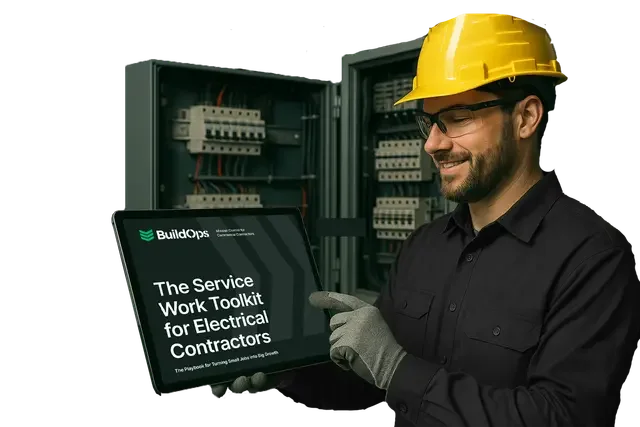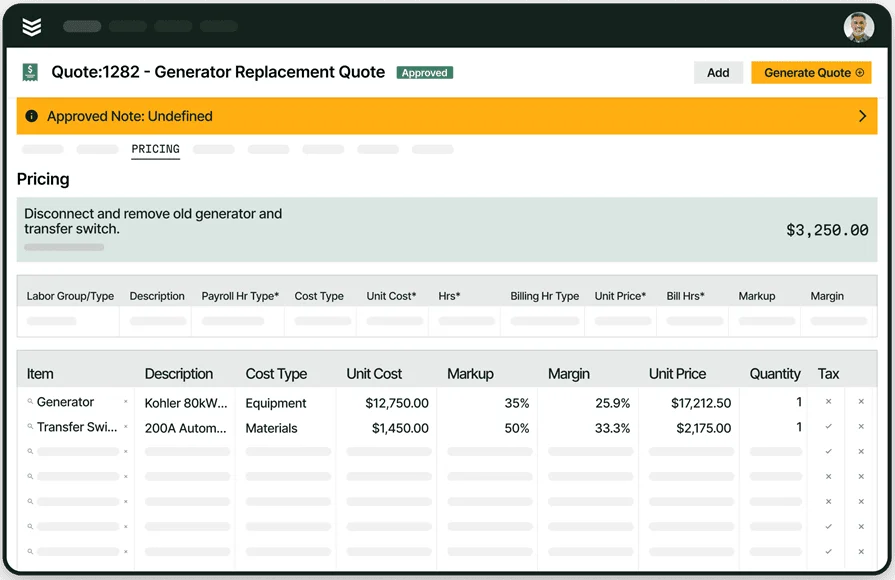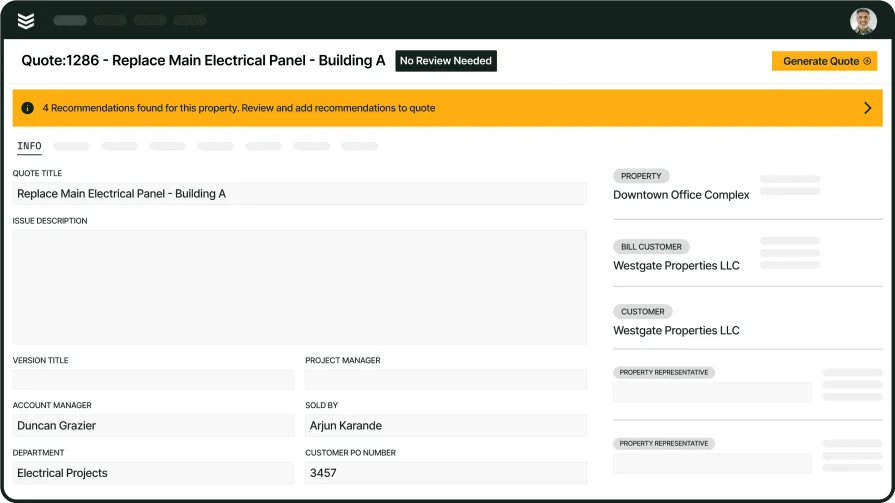Important
While BuildOps does not currently offer a specific electrical flat rate pricing book, pricing for electrical work is fully integrated into our software, and we’re always looking into new and exciting tools and technology that are moving the industry forward, which is why we’re discussing the subject here.
For electrical contractors juggling service calls, installation work, and urgent troubleshooting, a flat rate pricing system can bring some much-needed order. Instead of quoting on the fly or underpricing labor, these books give your team a go-to reference for consistent, transparent pricing across the board.
That matters big time in the electrical industry, where the work never slows down and every minute counts. Whether you’re running a lean service crew or managing multiple teams, having a solid flat rate pricing book helps you avoid guesswork, lock in consistent pricing, and speed up how fast you quote and collect. Here’s what we’ll break down:
- What is an electrical flat rate pricing book?
- The 3 typical electrical pricing models
- The limits of using an electrical flat rate pricing template
- 5 benefits of using an integrated electrical flat rate book
- How to maximize efficiency and profit with electrical estimating and invoicing software
Before you start building or updating a flat rate system, it helps to understand exactly what an electrical flat rate pricing book is—and what it’s not. A lot of folks throw the term around, but there’s more to it than just a printed list of prices. Let’s break it down.
What is an electrical flat rate pricing book?
An electrical flat rate pricing book is a catalog of common electrical services paired with fixed prices, used by contractors to quote jobs quickly and consistently. This eliminates the need to calculate labor and materials on-site, helping technicians give accurate quotes right at the job.
Instead of writing up prices on the fly or adjusting rates based on guesswork, electricians can reference this pricing book for nearly every job—from panel replacements to light fixture installs. It keeps the pricing clear, consistent, and fast—especially helpful when techs are in the field, managing multiple calls in a day.
The 3 typical electrical pricing models
When it comes to pricing electrical work, there are three main ways contractors charge their customers. Each model has its strengths, and the one you choose can shape how you bid, invoice, and build trust with clients.
- Time and materials: This model charges for the actual hours worked plus the cost of materials used. It gives customers an itemized breakdown but can lead to surprise totals if a job runs longer than expected.
- Flat rate: With this approach, each job is priced in advance using a set rate that includes labor, materials, and overhead. Customers know exactly what they’re paying upfront—no matter how long it takes to complete the task.
- Tiered pricing: This method offers service packages at different price levels - think basic, standard, and premium. Each tier bundles a set of services or features, giving customers flexibility based on their needs and budget.
Transitioning from how these models work to how they fall short is key, especially if you're still leaning on outdated systems. Let’s talk about where flat rate templates fall behind. Coming up next: The limits of using a flat rate pricing template.
The limits of using an electrical flat rate pricing template
On paper, an electrical flat rate pricing template sounds like a smart way to bring structure to your quoting process. But in the field, it can feel like just another thing slowing you down. Most templates—whether in spreadsheets, printouts, or static files—still leave you doing the heavy lifting. Techs are flipping through pages to price out a panel upgrade, calculating labor on a lighting retrofit, and manually adjusting for material costs when copper prices spike.
Even digital versions often miss the mark. Just because your pricing book lives on a screen doesn’t mean it’s saving time. If your electricians are still digging for job codes, typing in labor for outlet installs, or building every estimate from scratch, you haven’t improved much. You’ve just swapped binders for a browser.
And then there’s the bigger issue—efficiency. If your crew is stuck referencing a template mid-job while wiring a subpanel or troubleshooting a breaker issue, that’s time they’re not solving problems, talking to customers, or heading to the next site. This kind of setup slows your workflow, increases room for mistakes, and makes it harder to train new electricians who are still getting up to speed.
With a system that ties pricing directly into your estimating and invoicing tools, all of that friction disappears. No more cross-checking part numbers or second-guessing labor times. Pricing auto-fills where it needs to, invoices build themselves, and your electricians stay focused on the job—not the paperwork. That kind of workflow upgrade matters, especially in the electrical industry, where response times and clarity can make or break your reputation.

Service Toolkit for Electrical Contractors
Learn how to unify your electrical process and get more efficiency out of your service work.
5 benefits of using an integrated electrical flat rate book
Relying on paper price books or static templates may get the job done, but they leave a lot of room for error, delay, and disconnect between the field and office. An integrated flat rate system paired with your estimating and invoicing tools can completely change how your electrical business runs day-to-day. Here’s how:
1. Predictable pricing across your team
Techs shouldn’t be making up pricing on the fly or wondering if someone else quoted a job differently last week. When pricing is standardized and built into your system, it’s easier for everyone to stay on the same page. This keeps quoting clean and consistent—even across multiple teams or locations. It’s also a big reason many shops move away from manual methods and toward integrated solutions where pricing is embedded directly into workflows.
2. Fewer errors on quotes and invoices
When pricing is disconnected from your paperwork, things slip through the cracks—duplicate charges, missing labor, or incorrect part totals. Systems that align pricing directly with your invoice layout help keep everything accurate and easy to track. This becomes even more effective when paired with a structured format, like an electrical contractor invoice template, which mirrors how flat rate data should be reflected in billing.
3. Faster training for new techs
If your pricing lives inside your software, new hires can hit the ground running. Instead of flipping through paper sheets or bugging dispatch, they search for a task and see the pre-set rate. It gives them confidence while cutting down training time. This also reduces the chance of early mistakes, which helps protect your margins and keeps customer trust intact.
4. Easier upselling and recommendations
When pricing is tied to digital estimates, it's easier for your techs to recommend upgrades or catch opportunities in the moment. Say they’re replacing a panel—if the system shows add-ons like surge protection or arc fault upgrades, they can bring it up with the customer right away. Software that links estimating and pricing together makes those conversations more natural, and less like a pitch.
5. More trust from your customers
Flat rate pricing builds trust because it’s transparent. Customers know what they’re paying for before a wrench hits the panel. And when those prices match the invoice down to the dollar, there’s no friction at the finish line. Tying this into your CRM lets you track preferences, past jobs, and open opportunities—giving your team a full picture of the relationship. Our CRM guide for electrical contractors explains how this kind of integration supports long-term customer relationships—not just one-time jobs.

Demo integrated electrical pricing
See how we connect pricing, scheduling, work done, and invoicing, all in one platform.
How to maximize efficiency and profit with electrical estimating and invoicing software
Fast quotes and accurate invoices shape how customers see your business. Without a flat rate pricing book, techs end up guessing, office staff spend time fixing errors, and customers lose confidence. When your pricing connects directly to your estimating and invoicing tools, your team works faster, your numbers stay accurate, and your jobs stay on track from the first quote to the final invoice. Here are a few best practices you can apply:
1. Use live pricing updates to keep estimates accurate
Electrical material costs don’t stay static. When your system pulls current pricing for wire, panels, or parts, your quotes stay dialed in. No manual updates. No guesswork. Just accurate numbers that reflect what things actually cost right now—so you’re not eating costs or underbidding by mistake.
Deep Dive
Our customers see a 75% approval rating on the estimates they send out. To learn how to send out bids that get approved more often and get it done faster, dive into our guide to electrical bidding.
2. Standardize service packages to simplify quoting
Bundling tasks into ready-made packages—like “outdoor lighting install” or “breaker panel swap”—saves time and removes confusion. Instead of building each quote from scratch, techs just pick the task and go. Customers get clear, consistent pricing. Your crew gets more time to focus on the job.
3. Automate invoice creation right from the estimate
When estimates and invoices are built from the same system, you skip the copy-paste chaos. Techs build the estimate, the customer signs off, and the invoice practically writes itself. It’s a clean handoff from field to office—no double entry, no missed charges, no delays getting paid.
When your flat rate book ties straight into your billing system, invoicing gets easier. Start by choosing from one of the best electrical contractor invoice templates and build from there—no missed line items, no backtracking.
4. Sync flat rate pricing with parts and inventory
Flat rate pricing should reflect what you actually have on hand. When your estimate system talks to your inventory, you know what’s available before you quote it. If a part’s out of stock, you see it right away. And if it’s in, you complete the job without multiple trips or callbacks. Even the best pricing book can fall short if your parts list is off, so keep your numbers accurate with electrical inventory management that syncs directly with your estimates.
5. Train your techs to estimate on the go
Quoting should happen where the work is happening—not back at the office. With mobile access to your estimating tools, your techs can build accurate quotes in the driveway, not hours later from memory. That speeds up approvals and gives customers more confidence. Plus, when techs can answer pricing questions on the spot, it eliminates the lag that slows jobs down and makes your crew look more professional.
A flat rate pricing book helps standardize your quotes—but pairing it with a smart electrical contractor bidding software takes your estimating process to the next level. Lock in speed and accuracy from the first bid to the final invoice.
6. Track win rates and quoting performance
Every quote tells a story. Did the customer approve it? How long did it take to close? Did the job hit your target margin? Tracking quote outcomes helps you see what’s working—and where the numbers are slipping. Maybe one tech consistently closes panel upgrades while another struggles with lighting retrofits. When your estimating system captures these insights, you can adjust your pricing, fine-tune training, or double down on services that convert better.
7. Set pricing rules to avoid underquoting
Integrated software with rule-based pricing eliminates that risk. You can set minimum labor rates, markup thresholds, or material pricing floors that automatically apply across every estimate. This keeps pricing in line with your business goals and protects your bottom line—even if a tech’s having an off day.
8. Link your estimates to service history
When your estimating tool connects to service history, techs can see what was fixed, replaced, or upgraded before they even walk in the door. That context changes the conversation. Instead of starting cold, they can reference past work, flag recurring issues, or proactively suggest upgrades. It shows the customer you’re paying attention—and that earns trust while boosting upsell potential.
If you want more tips, check out our full guide to electrical cost estimating, which can help make your estimates for electrical work more accurate, while still getting them off to customers to approve much faster.
Flat rate pricing books have long helped electrical contractors bring consistency to their jobs—but when those systems live on paper or spreadsheets, they hit a wall. Integrating your pricing into your estimating and invoicing process doesn’t just improve accuracy—it transforms how your business runs. From cutting down quoting time to syncing with inventory and tracking job performance, every part of the process gets tighter.
Most tools in the market offer pieces of this puzzle. BuildOps brings it together. As an all-in-one platform purpose-built for commercial contractors, it connects your estimating, pricing, scheduling, and invoicing in one place—so your team spends less time juggling systems and more time getting the job done.

Schedule a free demo
See how the platform works, and learn how to integrate flat rate pricing into your software.






